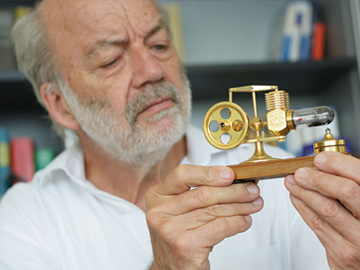 [Image: S. Spangenberg]
[Image: S. Spangenberg]
Last November, when I started drafting my first message for OPN (for the January 2024 issue), I wondered whether I would find enough topics worth bringing up. But I have gradually realized that there are many more suitable topics than there are months in my year as Optica president. For July/August 2024, as the vacation season commences in my home area, I have picked climate change—but not the kind of climate change you might assume.
As scientists we are part of society, both nationally and globally. Changes in society affect everyone, including scientists. Recently, the societal climate seems to have been changing, slowly but surely, in ways noticeable to all and threatening to some. The climate change I refer to concerns the way people argue with one another, and it seems to lead to polarization in our societies. Interestingly, this seems to be a global trend, not just one limited to a few countries; the threat it poses is addressed in books such as How Democracies Die by Steven Levitsky and Daniel Ziblatt.
As a citizen I am, of course, concerned. As a scientist, I hope that the culture of science could be an example for the rest of society.
A researcher with blinders, not seeing left or right, will hardly be successful. In science, we learn that our thoughts and ideas can contrast starkly with experimental evidence, and that changing our thinking as a consequence is not a weakness but a strength. Our colleagues might be competitors, but they are not enemies, and tolerance and mutual respect are not merely nice behaviors but are key to success. Of course, scientists are no better than others as people per se. But in the course of our work we learn—sometimes the hard way—that observations of nature provide an uncompromising gauge we had better accept.
For society at large, the gauge is the majority opinion of citizens—and this gauge is, I fear, more subtle. It can be compromised by how information is spread, something that has undergone revolutionary development due to technologies that, as usual, have both upsides and downsides. If things do not go well, society may become increasingly polarized.
We do not, of course, all have the same opinions, and we must work with others to find solutions for the most pressing problems, which is sometimes a struggle. We should not be shy and should speak up whenever the situation and our experience demand it. But the methods of science highlight the importance of doing so with mutual respect and tolerance—and with a common goal: achieving what is best for people as a whole. (A TED talk by the Nigerian writer Chimamanda Ngozi Adichie, “The Danger of a Single Story,” offers an eloquent statement of the need to find common ground.)
As a society we will probably never come to a static equilibrium. In a phrase sometimes attributed to the Chinese philosopher of 2,500 years ago, Lao Tzu, “A journey of a thousand miles begins with one step”—but even after many such steps, society comes no closer to its “destiny.” Perhaps a better guide is another saying with ancient roots: “The journey is the reward.” It is up to all of us to make sure we stay on a good track and the journey goes well.
—Gerd Leuchs,
Optica President
View Japanese, Chinese, French, German and Spanish translations of this message:
